
Despite Big Tech fighting tooth and nail against the Digital Markets Act (DMA), the new EU competition entered into force this week.
The new rules will force the titans of Silicon Valley to significantly ease their chokehold of European digital markets or risk facing eye-watering fines for their failure to act.
In other words, the DMA significantly strengthens EU antitrust regulators’ ability to crack down on monopoly-like behaviours from so-called gatekeepers.
Market watchers have hoped market watchdogs would be able to beef up their antitrust toolbox for many years. The new regulation could be a game-changer in how regulators police the industry.
“EU antitrust enforcers would abandon lengthy proceedings against large platforms in favour of ensuring minimum conditions to avoid monopolies,” Laura Petrone, principal analyst at research firm GlobalData tells Verdict.
“It essentially introduces a list of prohibited behaviours, like self-preferencing, or using competitor’s data to gain an advantageous position.”
How well do you really know your competitors?
Access the most comprehensive Company Profiles on the market, powered by GlobalData. Save hours of research. Gain competitive edge.

Thank you!
Your download email will arrive shortly
Not ready to buy yet? Download a free sample
We are confident about the unique quality of our Company Profiles. However, we want you to make the most beneficial decision for your business, so we offer a free sample that you can download by submitting the below form
By GlobalDataExamples of changes that gatekeepers will have to implement include ensuring end users can easily unsubscribe from core platform services or uninstall pre-installed core platform services, stopping the installation of software by default alongside the operating system, providing advertising performance data and ad pricing information, allowing developers to use alternative in-app payment systems or allowing end users to download alternative app stores.
There is also a notification obligation clause in the act. Gatekeepers must notify the European Commission of mergers if merging or acquired entities which “provide core platform services” or enable data collection.
This clause is aimed at catching so called killer acquisitions. It refers to Big Tech companies acquiring or merging with startups or companies that could go on to become rivals. It allows the EU commission to be aware of deals classed as anti-competitive.
The DMA covers 10 core platform services: online intermediation services, online search engines, social networks, video-sharing platforms, number-independent interpersonal communication services, operating systems, advertising services, web browsers, and virtual assistants.
A glance at that list should be enough to see why executives at some of the most well-known tech titans may have tried to stifle a scream or two into a pillow this week.
What is the Digital Markets Act?
The DMA is only applicable for companies designated as gatekeepers, which are companies that are deemed to play a particularly important role in the digital markets.
Gatekeepers are defined by their size and their ability to control an important gateway for business users towards final consumers.
Starting with size, gatekeepers must have an annual EU turnover equal to or above €7.5bn in each of the last three years or where its average market capitalisation amounted to at least €75bn as well as providing their core platform service in at least three member states.
The DMA also presumes the company’s status as a gatekeeper if it has more than 45 million monthly active EU end users and 10,000 yearly EU business users.
To ensure that Big Tech firms comply with the DMA, the EU can fine non-compliant companies up to 10% of their total worldwide turnover or 20% for repeated infringements.
The DMA also enables companies who suffer due to gatekeepers’ anti-competitive behaviours to seek damages for their non-compliance to the new regulation.
How will major tech giants be affected by the Digital Markets Act?
The DMA forbids companies labelled as gatekeepers from treating their own products and services more favourably than similar ones offered by third parties on the gatekeeper’s platform. In other words, this could be bad for companies like Amazon.
“This might have huge implications for Amazon’s dual role as a retailer and a marketplace for other retailers, which is already under scrutiny from EU regulators,” Petrone says. “This role raised concerns Amazon could be using sensitive information about competitors’ products to gain unfair advantages over smaller sellers.”
The new rules about users getting the legal right to uninstall applications could also stop Apple’s practice of preloading many of its services on devices without giving consumers a prior choice.
Allowing apps to offer in-app payments could also hobble another aspect of Apple’s App Store practices. The iPhone maker has faced a lot of criticism over the past few years for taking a 30% of profits made from in-app purchases.
Apple famously banned Fortnite-developer Epic Games after it had tried to side-step that by offering an alternative payment model. Epic Games subsequently sued Apple for it. The court case resulted in a mixed ruling where Epic Games won some points and Apple some.
“The DMA will change the digital landscape profoundly,” Europe’s antitrust chief Margrethe Vestager, who initially proposed the legislation, said earlier this week.
Given the scope of the new antitrust rules, she could be proven right.







